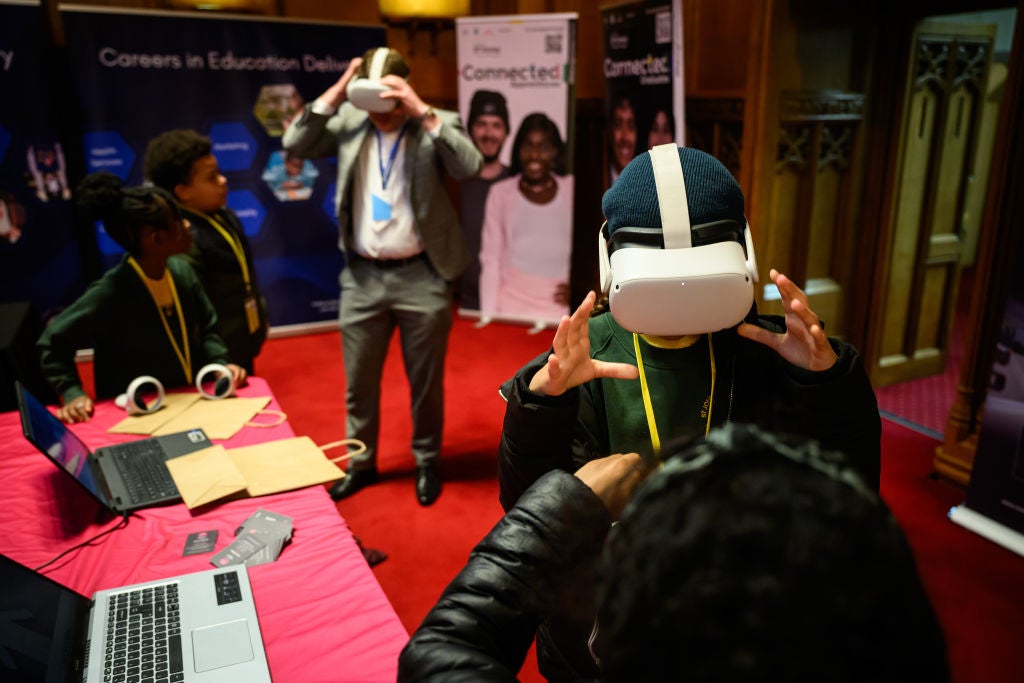
From training to creating brand awareness, the business use case for Virtual Reality (VR) and Augmented Reality (AR) is strong. However, according to a new study by Capgemini, the UK has been slow to wake up to the benefits of AR and VR in business. Does a delay in adopting the innovative technology leave UK businesses at risk of falling behind?
For its latest report, “Augmented and Virtual Reality in Operations: A guide for investment”, Capgemini surveyed over 700 individuals in the manufacturing, utilities and automotive sectors who are involved in their organisation’s AR/VR initiatives.
It found that globally, 82% of companies that are implementing AR or VR technology say the benefits are either meeting or exceeding their expectations. Furthermore, 50% of enterprises not currently not implementing AR and VR in business will start exploring immersive technologies within the next three years.
However, although globally the uptake of the technology is rising rapidly, the report found that the UK is the second lowest implementer of AR, with 36% of organisations implementing the technology, and the third lowest in VR. The country is behind the US, China and France, with over 50% of companies surveyed in the US and China already implementing immersive technology for business operations.
Why AR and VR in business is slow to take off
Capgemini suggests that one of the reasons uptake of AR and VR in business has been slower in the UK is a lack of a clear use case for the technology.
In the UK, 75% of respondents were concerned about complexity of the technology and 74% were conscious of potential security issues.
How well do you really know your competitors?
Access the most comprehensive Company Profiles on the market, powered by GlobalData. Save hours of research. Gain competitive edge.

Thank you!
Your download email will arrive shortly
Not ready to buy yet? Download a free sample
We are confident about the unique quality of our Company Profiles. However, we want you to make the most beneficial decision for your business, so we offer a free sample that you can download by submitting the below form
By GlobalDataOnly 42% of UK respondents believe AR will become mainstream in 3-5 years. 45% believe VR will be widely available in 3-5 years – longer than the global average – suggesting a lack of confidence in the impact of VR and AR.
However, although somewhat costly to implement, the report highlights how the technology can improve productivity and streamline workflow, which could greatly benefit UK businesses.
It cites the example of technicians at car manufacturer Porsche using AR glasses that project step-by-step bulletins and schematic drawings across the line of vision, while also allowing remote experts the ability to see what the technician sees to provide feedback.
Competitive benefits of AR and VR
According to the report, at least three in four companies with large-scale AR/VR programmes confirmed that they had experienced operational benefits of over 10%.
Chief Innovation Officer at Capgemini Lanny Cohen believes that businesses must invest in AR and VR to remain competitive:
“Immersive technology has come a long way in a short time and will continue to evolve. Faced with stiff competition from aggressive investors in the US and China, businesses need to streamline investment to seize the long-term growth potential this technology offer.
“To drive the highest business value from AR and VR, companies need a centralized governance structure, proofs of concept that are aligned with business strategy, and to be able to drive innovation and employee change management.”
The skills gap challenge
A shortage of in-house expertise is on factor hindering the uptake of VR and AR in the UK, with a growing digital skills gap negatively affecting businesses. According to a study carried out by the British Chamber of Commerce in 2017, 75% of UK businesses reported a digital skills shortage amongst their employees.
Last month, Verdict reported that the London College of Communication is launching a new VR degree range in response to growing demand and narrow the gap.
But how should UK businesses go about implementing the technology Capgemini outlined four key pieces of advice: putting a centralised system in place to manage all of an organisations VR/AR activities, invest in experts to prepare for the future, focus on use cases that will actually benefit employees, and ensure that VR/AR is smoothly integrated with existing technologies.







